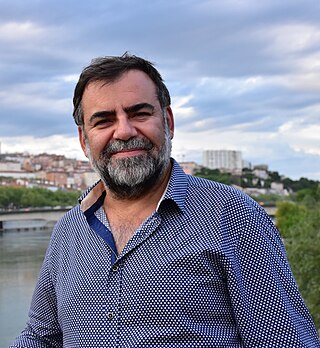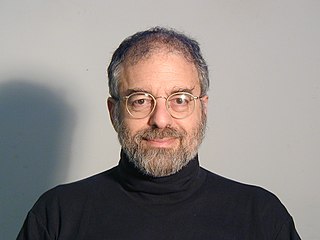Harold W. Thimbleby (born 19 July 1955) is a British professor of computer science at Swansea University, Wales. He is known for his works on user interface design within the realm of human computer interaction. [1]
Harold W. Thimbleby (born 19 July 1955) is a British professor of computer science at Swansea University, Wales. He is known for his works on user interface design within the realm of human computer interaction. [1]
Harold Thimbleby held the post of director of UCLIC, University College London's Interaction Centre, from its establishment in 2001. From 2001 to 2004, he was also the 28th Professor of Geometry at Gresham College, London. Thimbleby founded the Future Interaction Technology Lab [2] at Swansea University in 2005. [3]
Thimbleby runs the Swansea University Research Forum, as well as giving talks on science and religion.[ citation needed ]
Thimbleby's research interests include:

Alan Curtis Kay is an American computer scientist best known for his pioneering work on object-oriented programming and windowing graphical user interface (GUI) design. At Xerox PARC he led the design and development of the first modern windowed computer desktop interface. There he also led the development of the influential object-oriented programming language Smalltalk, both personally designing most of the early versions of the language and coining the term "object-oriented." He has been elected a Fellow of the American Academy of Arts and Sciences, the National Academy of Engineering, and the Royal Society of Arts. He received the Turing award in 2003.

Bjarne Stroustrup is a Danish computer scientist, most notable for the invention and development of the C++ programming language. Stroustrup served as a visiting professor of computer science at Columbia University in the City of New York beginning in 2014, where he has been a full professor since 2022.

A computer program is a sequence or set of instructions in a programming language for a computer to execute. It is one component of software, which also includes documentation and other intangible components.

Donald Ervin Knuth is an American computer scientist and mathematician. He is a professor emeritus at Stanford University. He is the 1974 recipient of the ACM Turing Award, informally considered the Nobel Prize of computer science. Knuth has been called the "father of the analysis of algorithms".

James Gosling is a Canadian computer scientist, best known as the founder and lead designer behind the Java programming language.
Alfred Vaino Aho is a Canadian computer scientist best known for his work on programming languages, compilers, and related algorithms, and his textbooks on the art and science of computer programming.
In software engineering, a software design pattern is a general, reusable solution to a commonly occurring problem within a given context in software design. It is not a finished design that can be transformed directly into source or machine code. Rather, it is a description or template for how to solve a problem that can be used in many different situations. Design patterns are formalized best practices that the programmer can use to solve common problems when designing an application or system.
The PenPoint OS was a product of GO Corporation and was one of the earliest operating systems written specifically for graphical tablets and personal digital assistants. It ran on AT&T Corporation's EO Personal Communicator as well as a number of Intel x86 powered tablet PCs including IBM's ThinkPad 700T series, NCR's 3125, 3130 and some of GRiD Systems' pen-based portables. It was never widely adopted.
Professor Alan Burns FREng FIET FBCS FIEEE CEng is a professor in the Computer Science Department at the University of York, England. He has been at the University of York since 1990, and held the post of Head of Department from 1999 until 30 June 2006, when he was succeeded by John McDermid.
Computer ethics is a part of practical philosophy concerned with how computing professionals should make decisions regarding professional and social conduct.
Jeffrey David Ullman is an American computer scientist and the Stanford W. Ascherman Professor of Engineering, Emeritus, at Stanford University. His textbooks on compilers, theory of computation, data structures, and databases are regarded as standards in their fields. He and his long-time collaborator Alfred Aho are the recipients of the 2020 Turing Award, generally recognized as the highest distinction in computer science.

Ben Shneiderman is an American computer scientist, a Distinguished University Professor in the University of Maryland Department of Computer Science, which is part of the University of Maryland College of Computer, Mathematical, and Natural Sciences at the University of Maryland, College Park, and the founding director (1983-2000) of the University of Maryland Human-Computer Interaction Lab. He conducted fundamental research in the field of human–computer interaction, developing new ideas, methods, and tools such as the direct manipulation interface, and his eight rules of design.

Ricardo A. Baeza-Yates is a Chilean-Catalan-American computer scientist that currently is the Director of Research of the Institute for Experiential AI at Northeastern University in the Silicon Valley campus. He is also part-time professor at Universitat Pompeu Fabra in Barcelona and Universidad de Chile in Santiago. He is an expert member of the Global Partnership on Artificial Intelligence, a member of the Association for Computing Machinery's US Technology Policy Committee as well as IEEE's Ethics Committee.
Richard Bornat, is a British author and researcher in the field of computer science. He is also professor of Computer programming at Middlesex University. Previously he was at Queen Mary, University of London.
Matt Jones is the co-author - with Gary Marsden - of Mobile Interaction Design and a full research Professor at Swansea University. With the late Marsden and Simon Robinson he authored a new book in 2015 - There's Not an App for That. He is an active researcher and has organized large scale of scientific conferences such as ACM CHI 2014. He has also edited several special issues of journals including an ACM ToCHI journal special issue on social issues and the "turn to the wild".
James David Foley is an American computer scientist and computer graphics researcher. He is a Professor Emeritus and held the Stephen Fleming Chair in Telecommunications in the School of Interactive Computing at Georgia Institute of Technology. He was Interim Dean of Georgia Tech's College of Computing from 2008–2010. He is perhaps best known as the co-author of several widely used textbooks in the field of computer graphics, of which over 400,000 copies are in print and translated in ten languages. Foley most recently conducted research in instructional technologies and distance education.
Ronald Baecker is an Emeritus Professor of Computer Science and Bell Chair in Human-Computer Interaction at the University of Toronto (UofT), and Adjunct Professor of Computer Science at Columbia University. He was the co-founder of the Dynamic Graphics Project (DGP), and the founder of the Knowledge Media Design Institute (KMDI) and the Technologies for Aging Gracefully Lab (TAGlab) at UofT. He was the founder of Canada's research network on collaboration technologies (NECTAR), a founding researcher of AGE-WELL, Canada's Technology and Agine research network, the founder of Springer Nature's Synthesis Lectures on Technology and Health, and the founder of computers-society.org. He also started five software companies between 1976 and 2015. He is currently an ACM Distinguished Speaker.

Aaron Marcus is an American user-interface and information-visualization designer, as well as a computer graphics artist.

Scott Klemmer is a human-computer interaction, user-centered design, usability, and computer science researcher and educator. He co-founded the Design Lab with Don Norman and Jim Hollan at the University of California San Diego in 2013. Klemmer is a professor in the Departments of Cognitive Science and Computer Science and Engineering, and formerly at Stanford University. His former advisees include the founders of the unicorn startups Instagram and Instabase.
Joëlle Coutaz is a French computer scientist, specializing in human-computer interaction (HCI). Her career includes research in the fields of operating systems and HCI, as well as being a professor at the University of Grenoble. Coutaz is considered a pioneer in HCI in France, and in 2007, she was awarded membership to SIGCHI. She was also involved in organizing CHI conferences and was a member on the editorial board of ACM Transactions on Computer-Human Interaction.